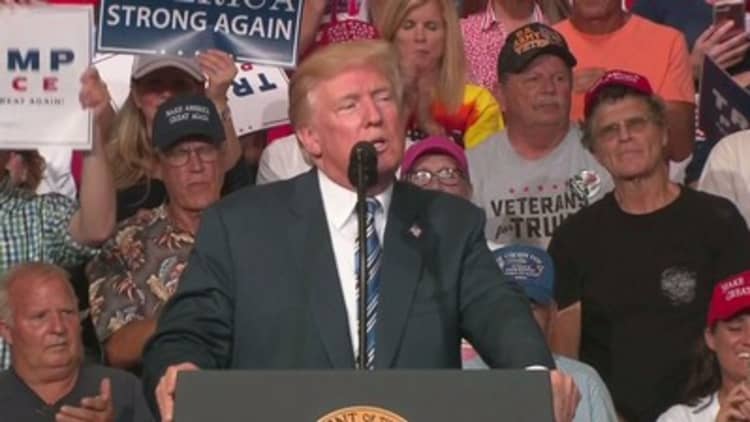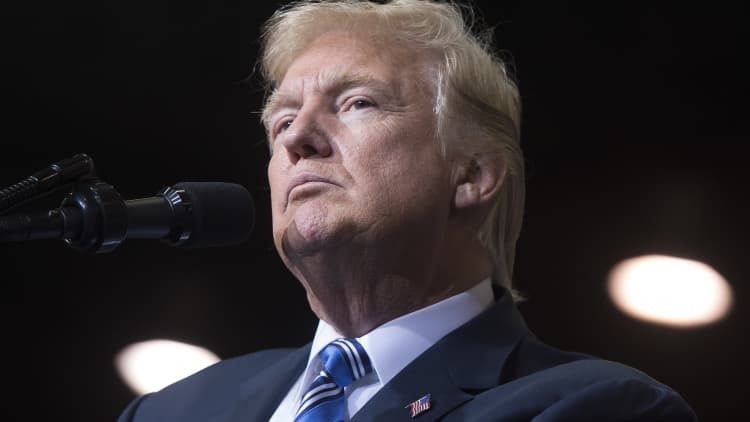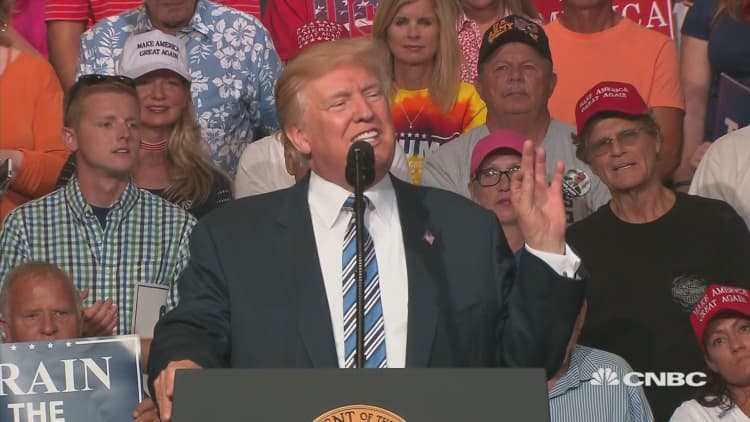
As political and legal troubles mount, President Donald Trump holds ever tighter onto a base of support that grows ever smaller.
Last night, Trump traveled for the second time in 10 days to West Virginia, the small conservative state that gave him 68 percent of the vote last November. He basked in the applause of the crowd while ridiculing the news that the Justice Department special counsel has impaneled a grand jury in Washington.
Last week, after the failure of health-care legislation he championed, the president stood before law enforcement officers and talked about rougher treatment for criminal suspects. His message — which roused blue-collar white backers in 2016 amid high-profile controversies over police use of deadly force against black citizens — was so jarring that police chiefs disavowed it.
Before that, Trump embraced the sensibilities of cultural conservatives by tweeting out a directive that transgender soldiers could no longer serve in the U.S. military. So abrupt was that order that military commanders, taken by surprise, declined to immediately implement it.
In some ways, the president's approach is no surprise. It mirrors his strategy in 2016, when the intense backing he enjoyed in a handful of key swing states propelled him to the White House even as he lost the popular vote to Hillary Clinton.
In campaigning and governing alike, all political strategists prize intense enthusiasm among their backers as a means of overcoming opposition that might be broader but more passive. That's how the National Rifle Association, for example, consistently defeats gun control measures that polls show are popular.

But Trump has placed cultivation of intensity within his base at the center of the administration's strategy across the board. Since he pursued a travel ban targeting Muslim-majority countries immediately after his inauguration, the president has made no serious effort to attract the majority of Americans who did not support his campaign.
On trade, Trump's threats of protective tariffs gratify workers displaced by foreign imports — but not the much larger number of consumers who benefit from lower prices.
On energy, he elevates economic casualties of the coal industry's decline in states like West Virginia over the larger number of workers in the growing renewable energy sector, including solar power.
On immigration, he advocates cutting legal as well as illegal immigration, drawing cheers from working-class supporters who feel aggrieved by economic and cultural change. But that step threatens to deprive the overall U.S. economy of workers needed for faster economic growth, and deprive the government of taxpayers needed to support swelling Social Security and Medicare expenses as baby boomers retire.
In friendly venues, this approach offers emotional rewards for a president who loves the adoration of crowds. For some of those he calls "the forgotten men and women of our country," it may deepen their sense that he's on their side.
But repeated setbacks have undercut any potential political benefits. Trump and fellow Republicans have failed to deliver on their pledge to repeal and replace Obamacare, without any major, offsetting legislative achievements.
A rolling series of disclosures about contacts between Trump associates and Russians have discredited the president's public denials. Just Thursday, the leaked transcript of a Trump phone call with the Mexican president showed that he understood the hollowness of his promise to supporters that Mexico would finance a border wall.
As a result, the share of Americans who approve of Trump's job performance keeps slowly drifting down. His average for January, according to figures from fivethirtyeight.com's Nate Silver, was 44.8 percent; for July, 38.9 percent. Just 20 percent of Americans now strongly approve of his performance, Silver says, while 47 percent disapprove.
And new Quinnipiac University national poll this week showed significant erosion even among his strongest demographic groups. In late January, the poll showed that 52 percent of whites without college degrees approved of Trump, while 31 percent disapproved. Now, 43 percent of non-college whites approve and 50 percent disapprove. Among white men, his net approval has fallen from plus 10 percentage points to minus 1.
More worrisome for the White House, the balance of intensity within his base has also flipped. In January, 45 percent of non-college whites approved of Trump "strongly," far outpacing the 27 percent who strongly disapproved. Now, just 29 percent strongly approve, while 43 percent strongly disapprove.
WATCH: Trump's West Virginia rally



